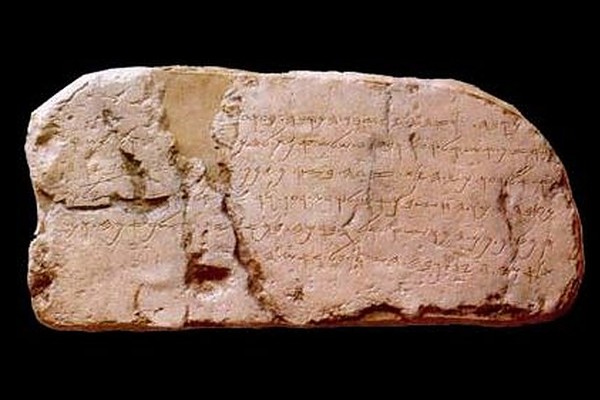Turkish officials denied reports that they had agreed to return the 2,700-year-old Siloam Inscription to Israel.
By Pesach Benson, United With Israel
One of the world’s most important Jewish archeological artifacts isn’t going to be transferred from Turkey to Israel as previously reported.
Turkish officials denied reports that they had agreed to return the 2,700-year-old Siloam Inscription to Israel, and that returning the artifact to Israel was out of the question because it had been found in “east Jerusalem.”
The Times of Israel reported on Friday that Turkey agreed to repatriate the engraving as a goodwill gesture to Israeli President Isaac Herzog during a state visit last week.
The Daily Sabah, a government mouthpiece, wrote, “Diplomatic sources told Anadolu Agency (AA) on Sunday that east Jerusalem, where the inscription was found in 1880, was part of Ottoman territories back then and it is currently a part of Palestinian territories; thus, it was out of the question to return it to Israel, a third country in Turkey’s view.”
According to the Daily Sabah, the engraving was registered with the Ottoman Empire and is now the legal property of Turkey.
Critics of the museum point out that many exhibited artifacts taken from far-flung areas of the Ottoman Empire have no cultural value to Turkey and should be repatriated.
The inscription was found in the Siloam tunnel which brings water from the Gihon Spring to the Pool of Siloam, in the City of David. It is among the oldest extant records of its kind written in Hebrew using the Paleo-Hebrew alphabet. The tunnel is referred to in the Book of Chronicles II (Chapter 32) as having been excavated during the reign of King Hezekiah.
Written in paleo-Hebrew on the wall of approximately the midpoint of the tunnel, the inscription describes how the excavators, working from both ends simultaneously, heard each other’s voices and cut through the last bit of rock between them so that the water could flow into Jerusalem.
The inscription was discovered in 1880, and in 1891, it was sent to the Turkish Museum in Istanbul. A replica of the engraving is displayed at the Israel Museum in Jerusalem.
Since the 1990s, Turkish authorities have rebuffed repeated efforts by Israel to repatriate the engraving.
The Turkish Museum also has another ancient caption from Jerusalem, known as the Temple Warning Inscription. Etched on the balustrade of the Second Temple, the tablet cautions pagan visitors not to proceed any further towards the Jewish holy site, on penalty of death.
